重大版 高中英语 必修1 Unit 6 Healthy Diet知识点 语法 课件(共30张PPT)
文档属性
| 名称 | 重大版 高中英语 必修1 Unit 6 Healthy Diet知识点 语法 课件(共30张PPT) |

|
|
| 格式 | zip | ||
| 文件大小 | 491.9KB | ||
| 资源类型 | 教案 | ||
| 版本资源 | 重庆大学版 | ||
| 科目 | 英语 | ||
| 更新时间 | 2019-05-13 00:00:00 | ||
图片预览

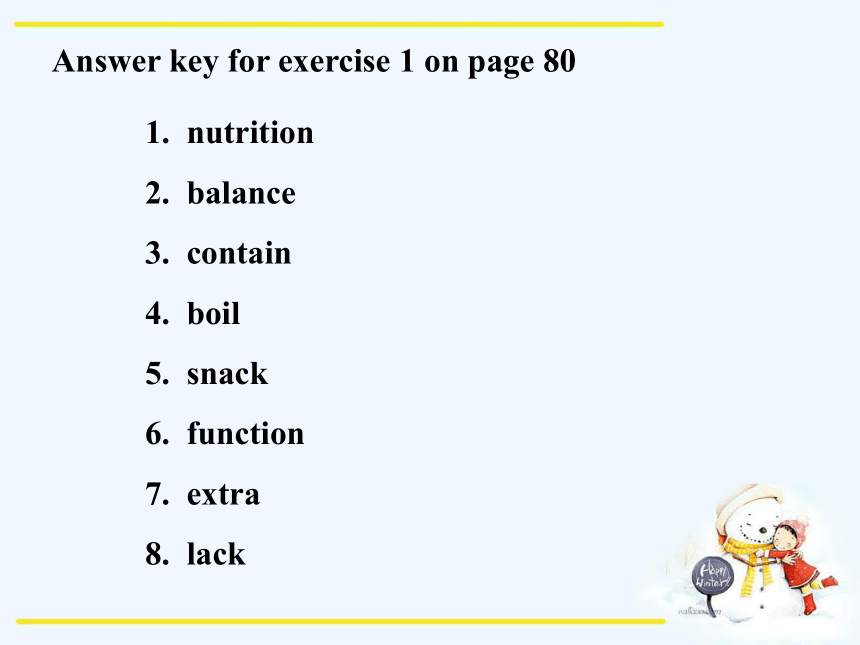

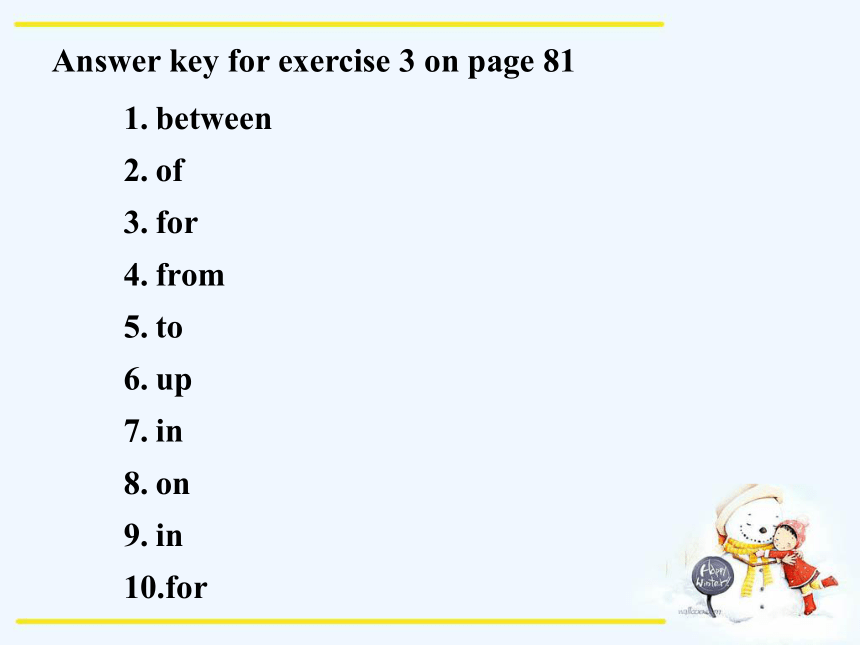
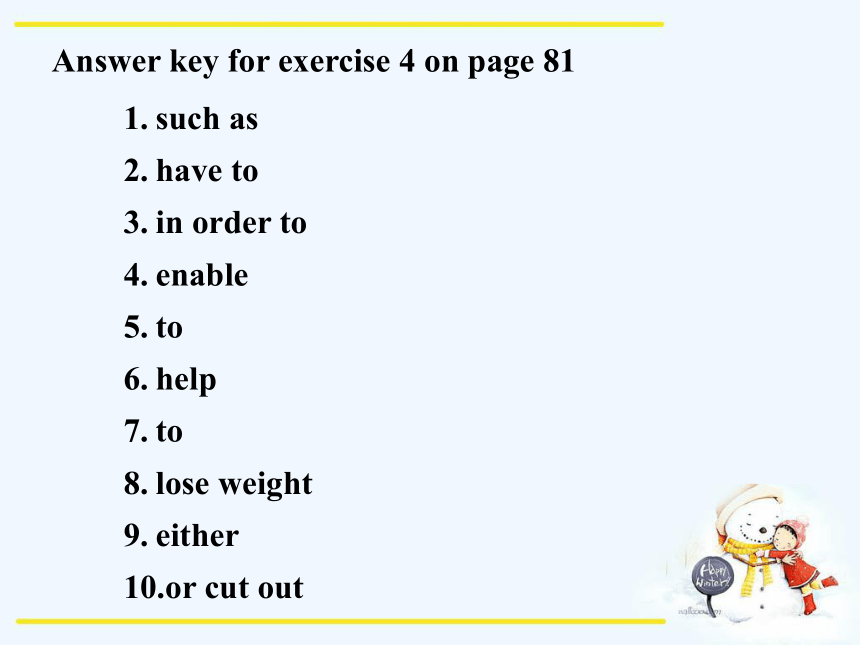
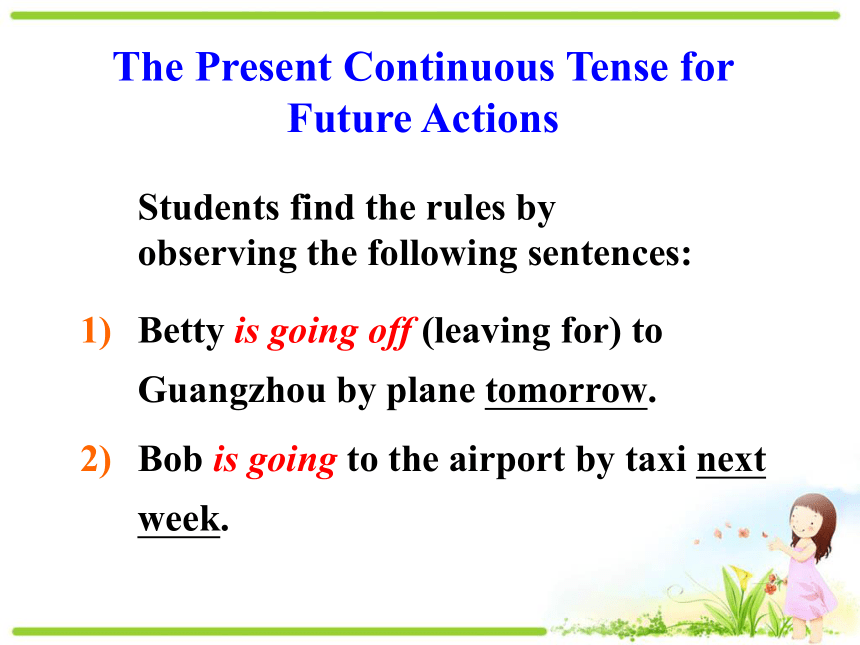
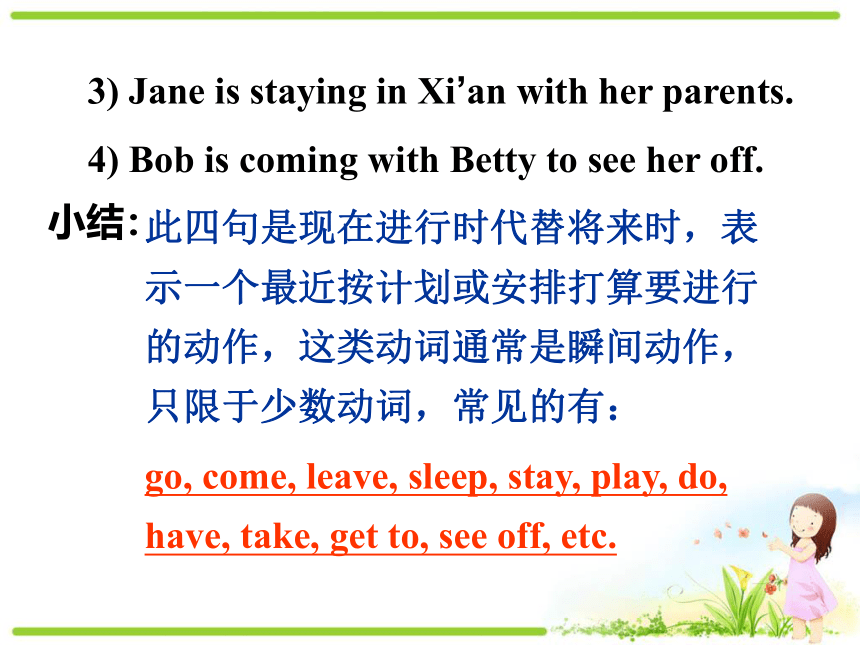

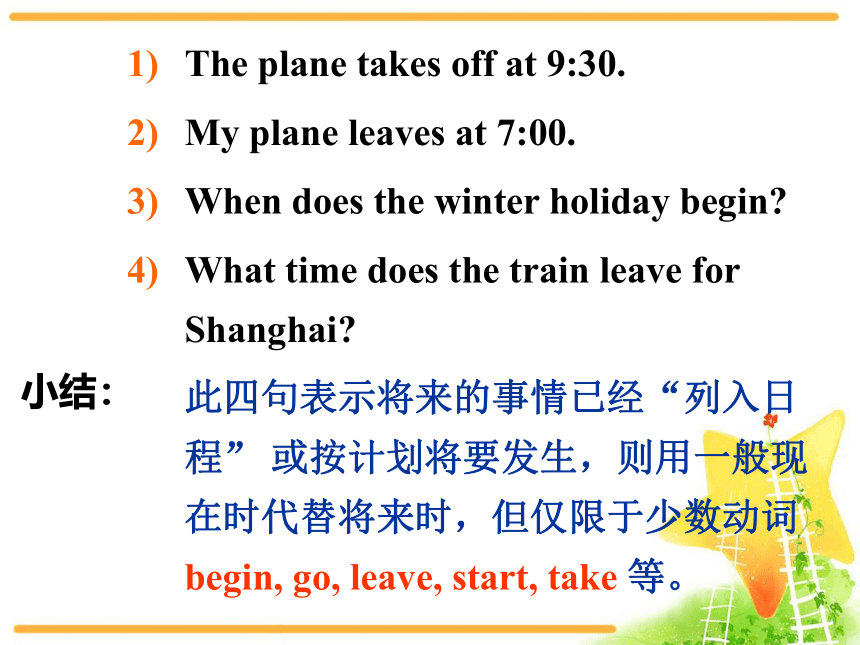
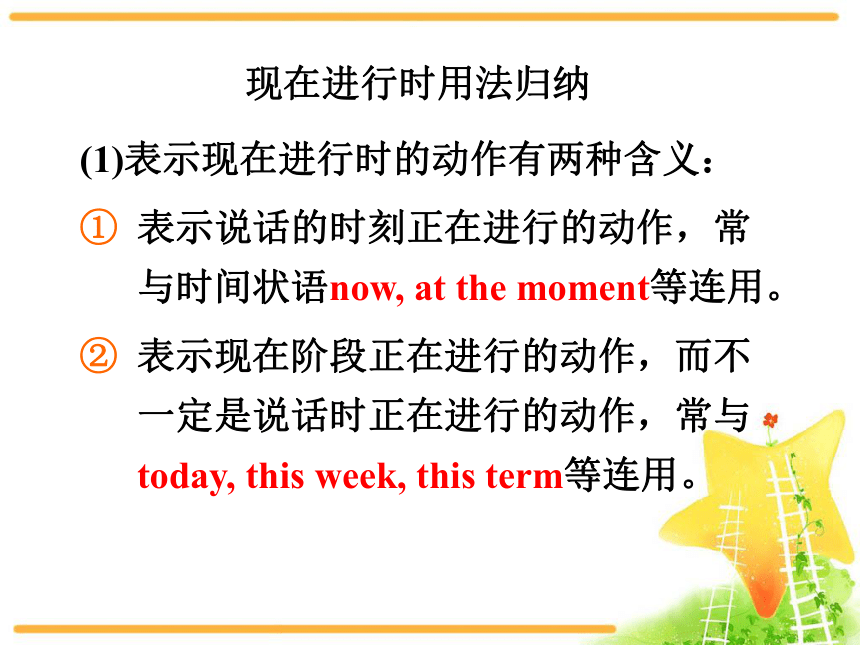

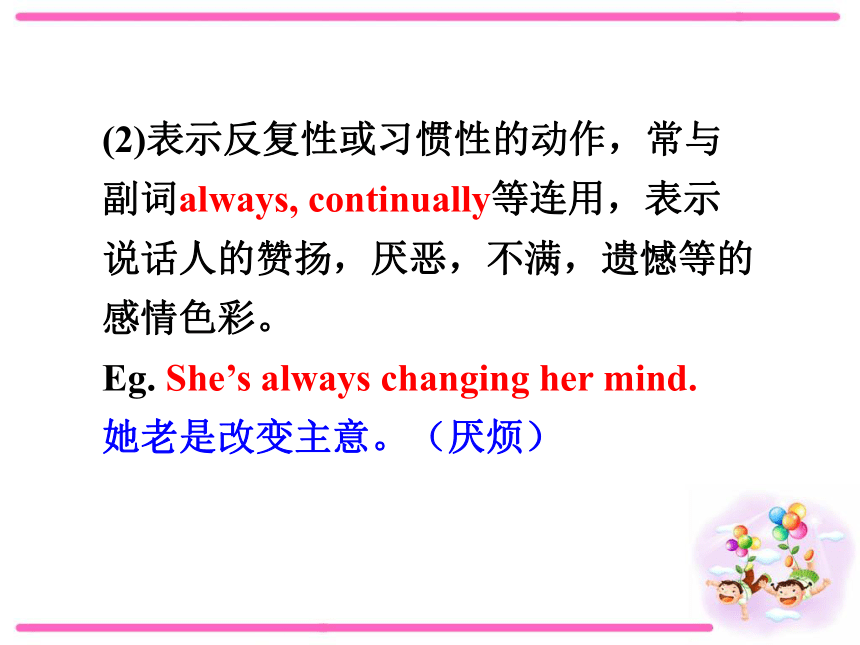
文档简介
课件30张PPT。Language FocusAnswer key for exercise 1 on page 80nutrition
balance
contain
boil
snack
fun_ction
extra
lackAnswer key for exercise 2 on page 81lack words
boil the potatoes
fun_ction properly
learn to balance
contains the information I need
as a snack
inadequate nutrition
get extra pay for extra workAnswer key for exercise 3 on page 81between
of
for
from
to
up
in
on
in
forAnswer key for exercise 4 on page 81such as
have to
in order to
enable
to
help
to
lose weight
either
or cut outThe Present Continuous Tense for Future ActionsBetty is going off (leaving for) to Guangzhou by plane tomorrow.
Bob is going to the airport by taxi next week.Students find the rules by observing the following sentences:3) Jane is staying in Xi’an with her parents.
4) Bob is coming with Betty to see her off.
此四句是现在进行时代替将来时,表示一个最近按计划或安排打算要进行的动作,这类动词通常是瞬间动作,只限于少数动词,常见的有:
go, come, leave, sleep, stay, play, do, have, take, get to, see off, etc.
小结:1)How are you feeling today?
2)He is always thinking others.
3)You are always leaving things about.
4)He is always talking big.亲切赞许不满厌烦此四句是现在进行时代替一般现在时,表示一个经常性重复的动作或状态,这时句中常带always 或forever, 以表示说话人的某种表情,如赞叹,厌烦,埋怨,等或强调情况的暂时性使其生动。The Present Continuous Tense for the present actions:小结:The plane takes off at 9:30.
My plane leaves at 7:00.
When does the winter holiday begin?
What time does the train leave for Shanghai?
此四句表示将来的事情已经“列入日程” 或按计划将要发生,则用一般现在时代替将来时,但仅限于少数动词begin, go, leave, start, take 等。小结:(1)表示现在进行时的动作有两种含义:
表示说话的时刻正在进行的动作,常与时间状语now, at the moment等连用。
表示现在阶段正在进行的动作,而不一定是说话时正在进行的动作,常与today, this week, this term等连用。
现在进行时用法归纳 Eg. Right now it is the summer vacation and I’m helping my dad on the farm.
现在是暑假,我在农场帮我爸爸干活。
I’m sitting on a rock near the river with my friends.
我和我的朋友们正坐在河边的一块岩石上。(2)表示反复性或习惯性的动作,常与副词always, continually等连用,表示说话人的赞扬,厌恶,不满,遗憾等的感彩。
Eg. She’s always changing her mind.
她老是改变主意。(厌烦)(3)表示不久之后肯定将发生,或按计划或安排将要做的事(常与未来的时间状语连用)能这样用的动词多是表示 “位移” “停留”的,如come, go , leave, arrive, start, begin等。
Eg. Mother is taking us home to see my
grandma on Sunday.
星期天母亲将带我们回老家看我祖母。He will write you a letter next week.
他下个星期会给你写信。
小结:will/shall+动词原形,表示将来某个间要发生的动作或存在的状态;或表示自然趋势或非主语意志。
I shall be sixteen years old next month.
下个月我将十六岁了。(自然趋势)表示将来的时态还有下列的方法:②be going to +动词原形,表示“就要……”,“打算……”或将要发生的事。
Eg. We’re not going to have any classes
next week.
表示“位移”的词,如arrive, come, go , leave, start, begin等,可用一般现在时表示将来安排好或即将发生的事。语气比现在进行时更肯定。
Eg. The next train leaves at 9:15.
In the following dialogue, a newspaper reporter is interviewing Wang Wei about her plans for the trip along the Mekong River. However, they are not sure about some of the verb tenses. Please complete their conversation.1R: Miss Wang, I hear that you________ (travel) along the Mekong River. Have you got everything ready?
W: Almost.
R: So when_____ you________ (leave)?
W: Next Monday.
R: How far________ you_________ (cycle) each day?are travellingareleavingcyclingare takingW: It’s hard to say. If the weather is fine, I think we’ll be able to ride 75km a day.
R: What about the weather in Qinghai Province?
W: The weather forecast is not good so we__________ (take) a large parcel of warm clothes with us.are takingR: What happens if you have an accident?
W: Don’t worry. I had some medical training at my college. Besides, we_________ (take) out insurance to cover any problems.
R: Well, it sounds fun. I hope you’ll have a pleasant journey. Thank you for your time.R: Where____ you _______ (stay) at night?
W: Usually in our tent, but sometimes in the villages along the river bank.arestayingare takingYou have got some plans for the future. Use the present continuous tense to express your future actions. Give as much information as you can.EXAMPLE: (this evening) I’m going out this evening. / I’m not doing anything this evening. / I don’t know what I’m doing this evening.2tomorrow morningthe day after tomorrownext Saturday eveningnext month1.---Did you tell Julia about the result?
--- Oh, no, I forgot. I ____ her now.
A. will be calling B. will call
C. call D. am to call B2. ---I’m going to the States?
---How long ___ you___ in the States?
are; stayed B. are; staying
C. have; stayed D. did; stayBExercise4. Selecting a mobile phone for personal use is not easy because technology ____ so rapidly.
A. will change B. has changed
C. will have changed D. is changing
D3. --- What’s that terrible noise?
---The neighbours ____ for a party.
A. have prepared B. are preparing
C. prepare D. will prepare B5. --- You’ve left the light on.
---Oh, I have. ___ and turn it off.
A. I go B. I’ve gone
C. I’ll go D. I’m goingCA6. --- Is this raincoat yours?.
---No, mine ____there behind the door.
A. is hanging B. has hung
C. hangs D. hung Translate the following statements:我下个月将去美国。
—————————————————
2.我姑姑在信上说她后天将到我们家。
—————————————————
3.我明天将什么东西也不做。
—————————————————
4.玛丽和我下个星期天去钓鱼。
—————————————————I am going to America next month.Mary and I are going to fish next Sunday.I am not doing anything tomorrow.My aunt said she is arriving at our home the day after tomorrow in the letter.Because the shop_______, all the T-shirts are sold at half price.
A. has closed down B. closed down
C. is closing down D. had had closed down
2. I’ve won a holiday for two weeks to Florida. I______ my mum.
A. am taking B. have taken
C. take D. will have taken 附:高考题CA3. ----Can I join your club, dad?
-----You can when you _______ a bit older.
get B. will get
C. are getting D. will have got
4. At this time tomorrow ______over the Atlantic.
A. we’re going to fly B. we’ll be flying
C. we’ll fly D. we’re to flyABStudying the ruleAnswer key for exercise 1 on page 831) Is, coming (√) , is leaving (√)
2) am flying, (√)
3) is playing
4)is studying, is attending (√)
5) Are, going (√)
6)is meeting (√)Answer key for exercise 2 on page 831.Are you going
2.I am taking
3.we’ll return
4.Are you going
5.are you taking 1)I am seeing Jane off at the airport tomorrow morning.
2) A: I am spending this winter holiday/vacation in Hainnan.
B: How long are you being there?
3)I am leaving ten minutes later.
4) Mr. Green is making a speech at the meeting tomorrow.
5) My parents are arriving on the morning of the day after tomorrow.Answer key for exercise 3 on page 83
balance
contain
boil
snack
fun_ction
extra
lackAnswer key for exercise 2 on page 81lack words
boil the potatoes
fun_ction properly
learn to balance
contains the information I need
as a snack
inadequate nutrition
get extra pay for extra workAnswer key for exercise 3 on page 81between
of
for
from
to
up
in
on
in
forAnswer key for exercise 4 on page 81such as
have to
in order to
enable
to
help
to
lose weight
either
or cut outThe Present Continuous Tense for Future ActionsBetty is going off (leaving for) to Guangzhou by plane tomorrow.
Bob is going to the airport by taxi next week.Students find the rules by observing the following sentences:3) Jane is staying in Xi’an with her parents.
4) Bob is coming with Betty to see her off.
此四句是现在进行时代替将来时,表示一个最近按计划或安排打算要进行的动作,这类动词通常是瞬间动作,只限于少数动词,常见的有:
go, come, leave, sleep, stay, play, do, have, take, get to, see off, etc.
小结:1)How are you feeling today?
2)He is always thinking others.
3)You are always leaving things about.
4)He is always talking big.亲切赞许不满厌烦此四句是现在进行时代替一般现在时,表示一个经常性重复的动作或状态,这时句中常带always 或forever, 以表示说话人的某种表情,如赞叹,厌烦,埋怨,等或强调情况的暂时性使其生动。The Present Continuous Tense for the present actions:小结:The plane takes off at 9:30.
My plane leaves at 7:00.
When does the winter holiday begin?
What time does the train leave for Shanghai?
此四句表示将来的事情已经“列入日程” 或按计划将要发生,则用一般现在时代替将来时,但仅限于少数动词begin, go, leave, start, take 等。小结:(1)表示现在进行时的动作有两种含义:
表示说话的时刻正在进行的动作,常与时间状语now, at the moment等连用。
表示现在阶段正在进行的动作,而不一定是说话时正在进行的动作,常与today, this week, this term等连用。
现在进行时用法归纳 Eg. Right now it is the summer vacation and I’m helping my dad on the farm.
现在是暑假,我在农场帮我爸爸干活。
I’m sitting on a rock near the river with my friends.
我和我的朋友们正坐在河边的一块岩石上。(2)表示反复性或习惯性的动作,常与副词always, continually等连用,表示说话人的赞扬,厌恶,不满,遗憾等的感彩。
Eg. She’s always changing her mind.
她老是改变主意。(厌烦)(3)表示不久之后肯定将发生,或按计划或安排将要做的事(常与未来的时间状语连用)能这样用的动词多是表示 “位移” “停留”的,如come, go , leave, arrive, start, begin等。
Eg. Mother is taking us home to see my
grandma on Sunday.
星期天母亲将带我们回老家看我祖母。He will write you a letter next week.
他下个星期会给你写信。
小结:will/shall+动词原形,表示将来某个间要发生的动作或存在的状态;或表示自然趋势或非主语意志。
I shall be sixteen years old next month.
下个月我将十六岁了。(自然趋势)表示将来的时态还有下列的方法:②be going to +动词原形,表示“就要……”,“打算……”或将要发生的事。
Eg. We’re not going to have any classes
next week.
表示“位移”的词,如arrive, come, go , leave, start, begin等,可用一般现在时表示将来安排好或即将发生的事。语气比现在进行时更肯定。
Eg. The next train leaves at 9:15.
In the following dialogue, a newspaper reporter is interviewing Wang Wei about her plans for the trip along the Mekong River. However, they are not sure about some of the verb tenses. Please complete their conversation.1R: Miss Wang, I hear that you________ (travel) along the Mekong River. Have you got everything ready?
W: Almost.
R: So when_____ you________ (leave)?
W: Next Monday.
R: How far________ you_________ (cycle) each day?are travellingareleavingcyclingare takingW: It’s hard to say. If the weather is fine, I think we’ll be able to ride 75km a day.
R: What about the weather in Qinghai Province?
W: The weather forecast is not good so we__________ (take) a large parcel of warm clothes with us.are takingR: What happens if you have an accident?
W: Don’t worry. I had some medical training at my college. Besides, we_________ (take) out insurance to cover any problems.
R: Well, it sounds fun. I hope you’ll have a pleasant journey. Thank you for your time.R: Where____ you _______ (stay) at night?
W: Usually in our tent, but sometimes in the villages along the river bank.arestayingare takingYou have got some plans for the future. Use the present continuous tense to express your future actions. Give as much information as you can.EXAMPLE: (this evening) I’m going out this evening. / I’m not doing anything this evening. / I don’t know what I’m doing this evening.2tomorrow morningthe day after tomorrownext Saturday eveningnext month1.---Did you tell Julia about the result?
--- Oh, no, I forgot. I ____ her now.
A. will be calling B. will call
C. call D. am to call B2. ---I’m going to the States?
---How long ___ you___ in the States?
are; stayed B. are; staying
C. have; stayed D. did; stayBExercise4. Selecting a mobile phone for personal use is not easy because technology ____ so rapidly.
A. will change B. has changed
C. will have changed D. is changing
D3. --- What’s that terrible noise?
---The neighbours ____ for a party.
A. have prepared B. are preparing
C. prepare D. will prepare B5. --- You’ve left the light on.
---Oh, I have. ___ and turn it off.
A. I go B. I’ve gone
C. I’ll go D. I’m goingCA6. --- Is this raincoat yours?.
---No, mine ____there behind the door.
A. is hanging B. has hung
C. hangs D. hung Translate the following statements:我下个月将去美国。
—————————————————
2.我姑姑在信上说她后天将到我们家。
—————————————————
3.我明天将什么东西也不做。
—————————————————
4.玛丽和我下个星期天去钓鱼。
—————————————————I am going to America next month.Mary and I are going to fish next Sunday.I am not doing anything tomorrow.My aunt said she is arriving at our home the day after tomorrow in the letter.Because the shop_______, all the T-shirts are sold at half price.
A. has closed down B. closed down
C. is closing down D. had had closed down
2. I’ve won a holiday for two weeks to Florida. I______ my mum.
A. am taking B. have taken
C. take D. will have taken 附:高考题CA3. ----Can I join your club, dad?
-----You can when you _______ a bit older.
get B. will get
C. are getting D. will have got
4. At this time tomorrow ______over the Atlantic.
A. we’re going to fly B. we’ll be flying
C. we’ll fly D. we’re to flyABStudying the ruleAnswer key for exercise 1 on page 831) Is, coming (√) , is leaving (√)
2) am flying, (√)
3) is playing
4)is studying, is attending (√)
5) Are, going (√)
6)is meeting (√)Answer key for exercise 2 on page 831.Are you going
2.I am taking
3.we’ll return
4.Are you going
5.are you taking 1)I am seeing Jane off at the airport tomorrow morning.
2) A: I am spending this winter holiday/vacation in Hainnan.
B: How long are you being there?
3)I am leaving ten minutes later.
4) Mr. Green is making a speech at the meeting tomorrow.
5) My parents are arriving on the morning of the day after tomorrow.Answer key for exercise 3 on page 83
